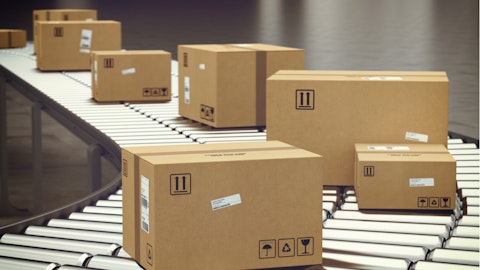Anthony Pettinari: Hey. I just had a question on pricing, following up on Phil’s earlier question. My understanding is the $55 million next year is cost out, which, I guess, is footprint optimization. Mark, you had talked about price increases that you were implementing. Is it possible to say how much unrecovered cost you’re exiting ’23 with that you expect to get back in ’24 with the price increases? And is that number sort of separate or incremental from the $55 million, which is cost out?
Mark Miles: Yes. We were, in ’23, we acted very promptly to recover inflation, that had occurred over the recent periods. Our outlook assumes a flat kind of price cost outside of the structural cost actions that we took in ’23. But to the extent, there’s incremental inflation, we will again be passing that through in a timely manner. So — but our outlook assumes flat, as you know, following the company a long time, over 75% of the years, we are positive on price cost outside of structural cost actions. So we feel comfortable with a flat guide outside of the structural cost improvements that we drove.
Anthony Pettinari: Okay. That’s helpful. And then maybe just — maybe a follow-up question on pricing that’s maybe a little bit more of a broader long-term question for Kevin. When you look at how Berry does pricing in terms of, percentage of sales that are on pass-throughs or contract terms or, how you match up against customers? And you compare that with the other packagers that you’ve, you’ve led? Are there opportunities or observations on the pricing side, when you look at Berry’s pricing, understanding you’re 50 days in?
Kevin Kwilinski: No. I think, in general, the approach has been quite similar to what I have seen in the past. And I would say they have a strong pricing discipline here at Berry. I think where we can find improvement as we think about our new product development and how we drive organic growth and where we focus our resources to drive that organic growth, we can pick areas that have more — where we will have more long-term pricing power, where the cost of the package is a smaller ratio of the finished product being sold. Those kinds of metrics and building that into our process in a way that exposes us to larger profit pools.
Anthony Pettinari: Okay. That’s helpful. I’ll turn it over.
Operator: Thank you. One moment for the next question. Our next question will be coming from Ghansham of Baird. Your line is open.
Ghansham Panjabi: Thank you, operator. Good morning, everybody. Kevin, also extend my congrats on your new role. Best wishes for the future. Understanding it’s very early in your tenure, can you share some initial observations on opportunities to, accelerate organic growth like you referenced? And just more holistically, how important will portfolio repositioning be in creating a platform to generate volume growth consistency, which has, obviously, been an issue for Berry over the years?
Kevin Kwilinski: Yeah. Thank you, Ghansham. I would say, the thoughts around growth and the opportunities, we have owned a very large opportunity around sustainability. And it isn’t theoretical because the reality of the world we are in is — Europe is quite a ways ahead of us. And we are operating in Europe — and we are seeing where legislation is going and the opportunities it creates for new sorts of highly recyclable — high recycled content, advanced recycle containing plastic products that the consumers want that fit within extended producer responsibilities and returnable, reusable options. And those drive very large opportunities for growth and share gain if we have products that are superior and differentiated. And I think a lot of the opportunity here will be to more tightly integrate the work that we’re doing in Europe to expand over the larger footprint that we have, knowing that what is happening there is going to end up happening here in the US, and other markets.
And I think — traditionally, I think the company operated a bit more siloed than I would like to see in terms of the whole commercial organization process and how we leverage areas for growth. And I’m sure there will be other observations that come as I learn more about the business, but that would be my initial take.
Ghansham Panjabi: Okay. And then just from a high-level standpoint, I mean, clearly, the company has looked externally for growth over the last several decades really. Is it fair to assume that there’s going to be more of an internal focus of the company over the next three years, let’s say, as you sort of, modernize the productivity aspect and refocus on these growth initiatives? Is that a fair statement?
Kevin Kwilinski: I’m not sure I understood the question exactly. I’m sorry.
Ghansham Panjabi: More — less acquisitions, more internal focus on productivity ramp-up…
Kevin Kwilinski: I see. Yeah, more focus on organic growth as opposed to acquisition growth.
Ghansham Panjabi: Correct.



